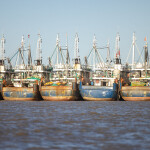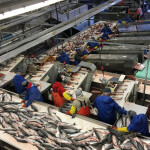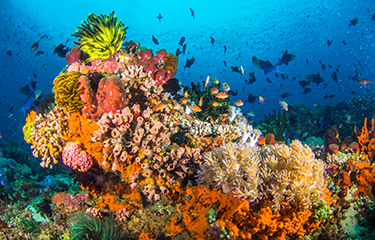A new study published in Nature has found that protecting key areas of the ocean would increase overall catch, help reduce carbon emissions, and protect biodiversity.
The study, “Protecting the global ocean for biodiversity, food and climate,” found that an increase in protected areas of the ocean could potentially protect biodiversity, increase the yield of fisheries, and secure marine carbon stocks at risk from human activity. The study also found that most coastal nations have areas that, if protected, could “contribute substantially to achieving these three objectives of biodiversity protection, food provision, and carbon storage.”
“In this study, we’ve pioneered a new way to identify the places that – if strongly protected – will boost food production and safeguard marine life, all while reducing carbon emissions,” Enric Sala, the lead author of the study, said in a press release. “It’s clear that humanity and the economy will benefit from a healthier ocean. And we can realize those benefits quickly if countries work together to protect at least 30 percent of the ocean by 2030.”
The authors of the study – marine biologists, economists, and climate experts – identified priority areas by analyzing the world’s unprotected ocean waters based on the degree they are threatened by human activity that could be reduced through protection. Then, they developed an algorithm to identify areas that would deliver the most benefit overall, and created a “blueprint” that can be used by governments to implement protections.
The study found that the majority of priority locations for protection are within the 200-mile exclusive economic zone of coastal nations, with only a few exceptions – like the Mid-Atlantic Ridge and the Mascarene Plateau in the Indian Ocean.
"Perhaps the most impressive and encouraging result is the enormous gain we can obtain for biodiversity conservation – if we carefully chose the location of strictly protected marine areas,” David Mouillot, a report co-author and a professor at the Université de Montpellier in France, said in a press release. “One notable priority for conservation is Antarctica, which currently has little protection, but is projected to host many vulnerable species in a near-future due to climate change."
The study also found that marine protected areas that ban all commercial fishing could end up boosting the production of fish overall.
“Some argue that closing areas to fishing hurts fishing interests. But the worst enemy of successful fisheries is overfishing – not protected areas,” Sala said.
The study found that in order for the protection to have a benefit, a minimum of 30 percent of the world’s oceans would need protecting.
That 30 percent number coincides with a U.S. President Joe Biden’s “30 by 30” plan, which aims to commit 30 percent of lands and oceans in the U.S. to conservation by 2030. That plan would include complete bans on any “commercial extractive use” in ocean areas covered. It has been opposed by numerous commercial fishing groups who oppose a blanket ban of all fishing activity in 30 percent of oceans owned by the U.S.
A recent report by the Biden administration, “Conserving and Restoring America The Beautiful,” which was sent to the National Climate Task Force, identified multiple principles to serve as the foundation as meeting the overarching goal – with fishing and fishery management, and the expansion of NOAA among them.
“There is no single best solution to save marine life and obtain these other benefits. The solution depends on what society – or a given country –cares about, and our study provides a new way to integrate these preferences and find effective conservation strategies,” University of California, Santa Barbara Environmental Market Solutions Lab Marine Data Scientist Juan S. Mayorga, a co-author of the study, said.
The results of the study have been welcomed by NGOs seeking to protect parts of the ocean. Oceana, which has campaigned to end the practice of bottom trawling worldwide, said the study is evidence that banning the practice and protecting areas of the ocean would have an overall benefit. The study found that eliminating 90 percent of the present risk of carbon disturbance due to bottom trawling requires protecting 4 percent of the ocean.
“A key finding of this study is that it’s possible to save the oceans and help feed the world,” Oceana Chief Scientist Katie Matthews said. “This research reveals that strategically placed marine protected areas (MPAs) that prohibit fishing can increase the number of fish in our waters, so much so that it could increase the catch of seafood by over eight million metric tons relative to business as usual. If we give fish and our oceans a little help, they can come back. Restoring the world’s oceans is urgent and necessary to alleviate global hunger and malnutrition, especially as the impacts of our climate crisis become more apparent.”
The research – according to Co-Author Ben Halpern, director of the National Center for Ecological Analysis and Synthesis at University of California, Santa Barbara – “is a bit like building a racecar,” in that it takes multiple objectives into account at once to produce a better outcome.
“We didn't just look at how to put the best tires on the car and then install a lawnmower motor, or design an aerodynamic shell but then add wooden wheels,” Halpern said. “By looking at three different conservation objectives at once, we could find a design that produced a Formula 1 outcome for the oceans."
Choosing to protect portions of the ocean, study co-author and Dalhousie University Killam Research Professor Boris Worm said, could be one of the most cost-effective ways to fight climate change.
“Smart ocean protection will help to provide cheap natural climate solutions, make seafood more abundant and safeguard imperiled marine species – all at the same time,” Worm said. “The benefits are clear. If we want to solve the three most pressing challenges of our century – biodiversity loss, climate change and food shortages – we must protect our ocean.”
Photo courtesy of SARAWUT KUNDEJ/Shutterstock







